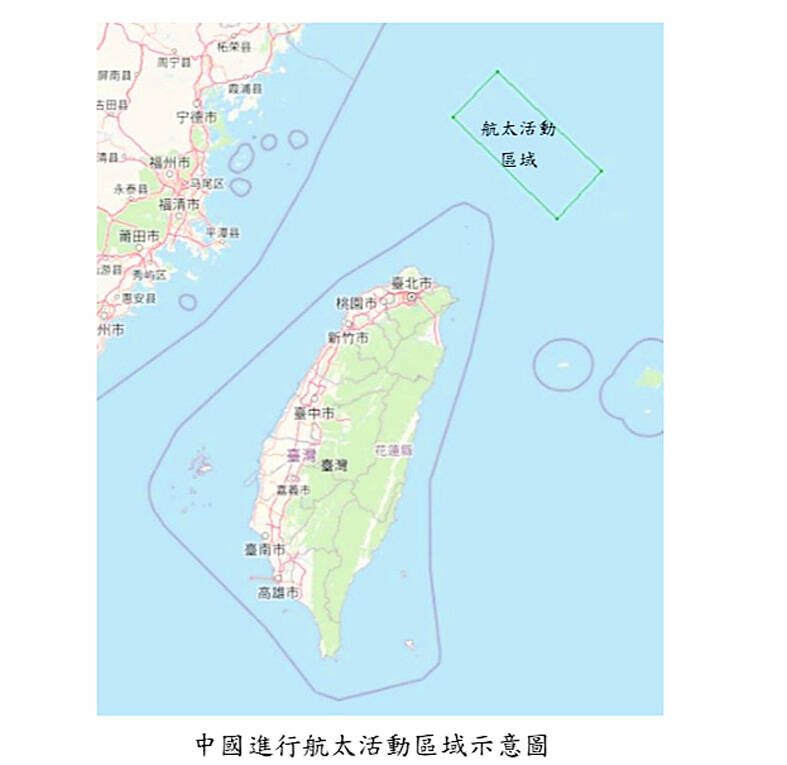China’s short notice that it is to implement a no-fly zone north of Taiwan from Sunday to Tuesday shows its disregard for international rules and poses a threat to regional flight security, experts said late on Wednesday.
Beijing informed Taiwan on Tuesday that it planned to implement a no-fly zone from 9am to 2pm from Sunday to Tuesday for the purposes of “conducting aerospace activities,” the Ministry of Transportation and Communications said.
The ministry said that the short notice given by Beijing, which was less than the standard seven days, flouted international norms and jeopardized flight safety in the area.

Photo courtesy of the Ministry of Transportation and Communications
Amid protests from Taipei, Beijing announced it would reduce the duration to 27 minutes on Sunday, averting wider travel disruption, the ministry said.
The no-fly zone is to be enforced about 85 nautical miles (157km) off the north of Taiwan and within Taiwan’s Taipei Flight Information Region (FIR) and northern air defense identification zone (ADIZ), the military said.
South Korea and Japan, which China also briefed on its plans, said the no-fly zone is being implemented due to concerns over falling debris from a satellite launch.
Before setting up a no-fly zone, China should have issued a notice to air missions, or NOTAM, at least seven days before the set date, aviation safety specialist Peng Szu-ming (彭斯民) said.
While such no-fly zones are normally set up within a country’s territorial space, they sometimes overlap with other countries’ FIRs and ADIZs, said Su Tzu-yun (蘇紫雲), a research fellow at the Institute for National Defense and Security Research.
In such cases, the country in question is required to inform nearby authorities in a timely manner beforehand so that they can make preparations for aviation safety, Su said.
China’s announcement did not follow international rules and Beijing deliberately set up the no-fly zone in the Taipei FIR, one of the busiest flight routes in the area, he said, adding that its actions pose a serious threat to regional and international aviation safety.
Chinese authorities only told Taiwan of the no-fly zone on Tuesday, six days instead of the standard seven days, Deputy Minister of Transportation and Communications Chi Wen-jong (祁文中) said.
China’s behavior showed a disregard for international regulations and norms, Su said, adding that Beijing was using the no-fly zone to attain regional hegemony and assert its claims over Taiwan.
Peng said that despite agreeing to cut short the duration of the no-fly zone, China had already successfully demonstrated to the world its ability to disrupt and block air traffic northeast of Taiwan.
Speaking to Bloomberg, Sung Wen-ti (宋文笛), a specialist on Taiwanese politics and cross-strait relations at Australian National University, said it was unusual that Beijing changed its plan following a complaint from Taiwan.
The change might be a sign of coordination problems within Beijing, he said.
“The aviation agency may have called for a more extended no-fly zone period out of technical necessity, but economic and foreign affairs portfolios subsequently scaled it back to minimize regional pushback,” he said.
The original schedule would have overlapped with the G7 foreign ministers’ meeting in Karuizawa, Japan, that is to be held from Sunday to Tuesday.

‘DENIAL DEFENSE’: The US would increase its military presence with uncrewed ships, and submarines, while boosting defense in the Indo-Pacific, a Pete Hegseth memo said The US is reorienting its military strategy to focus primarily on deterring a potential Chinese invasion of Taiwan, a memo signed by US Secretary of Defense Pete Hegseth showed. The memo also called on Taiwan to increase its defense spending. The document, known as the “Interim National Defense Strategic Guidance,” was distributed this month and detailed the national defense plans of US President Donald Trump’s administration, an article in the Washington Post said on Saturday. It outlines how the US can prepare for a potential war with China and defend itself from threats in the “near abroad,” including Greenland and the Panama

A magnitude 4.9 earthquake struck off Tainan at 11:47am today, the Central Weather Administration (CWA) said. The hypocenter was 32.3km northeast of Tainan City Hall at a depth of 7.3km, CWA data showed. The intensity of the quake, which gauges the actual effect of a seismic event, measured 4 in Tainan and Chiayi County on Taiwan's seven-tier intensity scale, the data showed. The quake had an intensity of 3 in Chiayi City and County, and Yunlin County, while it was measured as 2 in Kaohsiung, Nantou County, Changhua County, Taitung County and offshore Penghu County, the data showed. There were no immediate reports of

The Chinese Nationalist Party (KMT) is maintaining close ties with Beijing, the Democratic Progressive Party (DPP) said yesterday, hours after a new round of Chinese military drills in the Taiwan Strait began. Political parties in a democracy have a responsibility to be loyal to the nation and defend its sovereignty, DPP spokesman Justin Wu (吳崢) told a news conference in Taipei. His comments came hours after Beijing announced via Chinese state media that the Chinese People’s Liberation Army’s Eastern Theater Command was holding large-scale drills simulating a multi-pronged attack on Taiwan. Contrary to the KMT’s claims that it is staunchly anti-communist, KMT Deputy

RESPONSE: The government would investigate incidents of Taiwanese entertainers in China promoting CCP propaganda online in contravention of the law, the source said Taiwanese entertainers living in China who are found to have contravened cross-strait regulations or collaborated with the Chinese Communist Party (CCP) could be subject to fines, a source said on Sunday. Several Taiwanese entertainers have posted on the social media platform Sina Weibo saying that Taiwan “must be returned” to China, and sharing news articles from Chinese state media. In response, the Mainland Affairs Council (MAC) has asked the Ministry of Culture to investigate whether the entertainers had contravened any laws, and asked for them to be questioned upon their return to Taiwan, an official familiar with the matter said. To curb repeated